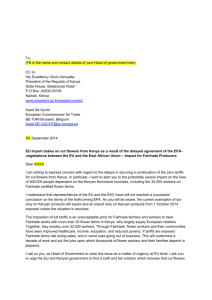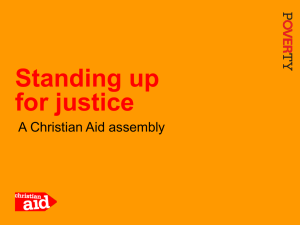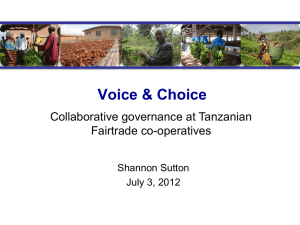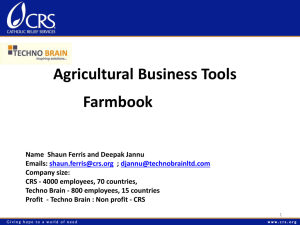Climate change Eastern Africa region
advertisement
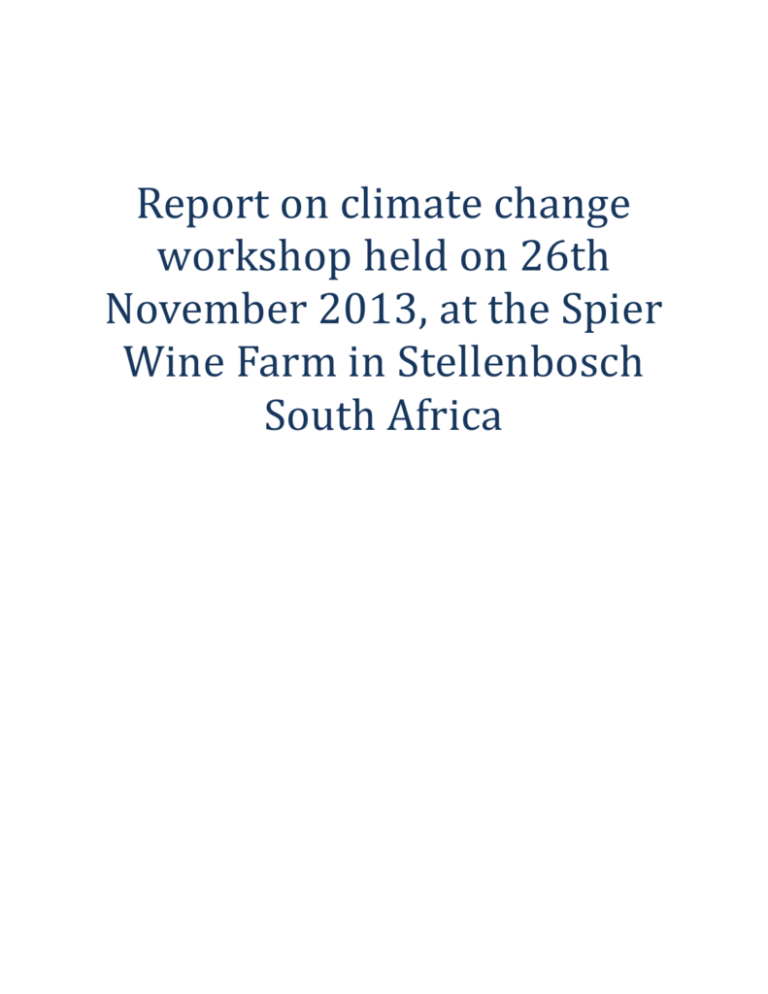
Report on climate change workshop held on 26th November 2013, at the Spier Wine Farm in Stellenbosch South Africa Executive Summary The Spier Wine Farm was the venue for the fourth annual Africa Fairtrade Convention, which took place from 25th to 29th of November, 2013. On Tuesday 26th November a workshop on climate change was conducted and this was attended by producer representatives from different countries with eagerness to learn tactics of adapting to the changing climate. The facilitator, Steve Law of Environmental Monitoring Group, oversaw the workshop. Producers opened up to discussions on how they are tackling climate change and what more can be done. Jason Ndegwa of Chinga Tea Factory from Kenya shared the impact of climate change on their tea production over the years and the measures they had taken to ensure they adapted to the changes and farmed sustainably. Introduction The effects of climate change are being acutely felt by farmers and workers all over Africa. To find possible ways of adapting and mitigating to this phenomenon, Fairtrade Africa organised a workshop where over 20 Fairtrade certified organisations had their representatives gather to share experiences. The workshop took place on the second day of the Africa Fairtrade Convention, on 26th of November 2013. Environmental Monitoring Group – predictions Giving an introduction of the glaring predicament that has now become a global problem being discussed in talks and conferences worldwide, Steve Law, the Director of EMG (Environmental Monitoring Group) emphasized the worsening situation as a result of climate change. “It is unfortunate that no concrete decisions are ever made from the yearly climate change talks like the recent COP19 in Warsaw” says Steve Law. “The talks always end up calling for similar conventions the following year.” Mr. Law further gave projections of the expected decline in the mean seasonal rainfall between the years 2036-2065. The participants got to debate on whether climate change is as a result of human activities or nature. And while defending their turf each representative got to share their mitigation strategies. (Steve Law’s presentation, appendix 1) Climate change Eastern Africa region From the Eastern Africa region Fairtrade Africa producer representatives from Kenya and Tanzania shared their predicaments. The producer representatives from Kiegoi Tea Factory located at the foothills of Mt Kenya explained how climate change has not only lowered their yields but affected the farmers too. Highland malaria has engulfed the residents of Maua town where the factory is located. They have also experienced frequent occurrences of frost bite that has caused immense losses in leaf amounting to millions of Kenya shillings. All these have led to reduction of their produce by more than 20% compared to the previous season. To mitigate the climatic changes they have planted indigenous eco-friendly trees and are using energy saving jikos (stoves). They do water harvesting and preservation and have introduced drought tolerant tea varieties. Producers from Tanzania have also not escaped the climate change menace. The coffee producers from Kagera Co-operative Union (KCU) are receiving unreliable rainfall and their coffee has been attacked by pests and the water sources have dried up. This has resulted in lower production, reduced income and poorer standards of living. “To adapt to climate change, we hold regular meetings with our smallholder farmers to create awareness about climate change” said Joram Katorojo, a lead farmer at KCU present at the workshop. ‘We also train them on good agricultural practices that are environmentally friendly. He added.’ Lebi Hudson, the CEO of Rungwe Smallholder Tea Growers Association located in Tukuyu Tanzania shared how their tea has been attacked by termites and thrips as a result of climate change. He further explained how they have suffered hailstorms and have had gradual reduction in output from 21.6kg per acre in 2011 to 19.7kg per acre in 2013. To adapt to climate change they have worked in collaboration with Tea Research Institute of Tanzania on drip irrigation which is on trial basis. They are implementing environmental conservation plans like using energy saving jikos, soil conservation and water conservation programmes, they are also multiplying plots for improved clones.” To diversify their income, Rungwe have come up with a piggery project where they loaned their farmers a pig each which is paid back with 3 female piglets to be given to other farmers. They have also taken up avocado farming. “Fairtrade has played a big part in helping us tackle climate change” adds Lebi. “Through Fairtrade and Vi-Agroforestry climate change project (AdapTEA), they have helped us in establishing farmer field schools,” he concludes. The rains which were expected November of every year by farmers from Igominyi Tea Growers Association in Tanzania are now starting in January greatly interfering with the farmers’ production calendar. To adapt to climate change they have embarked on afforestation and they apply sustainable agricultural land management practices. The farmers of Igominyi have chosen to diversify to fruit farming to be more sustainable, they are now constructing fish ponds and are planning to embark on fish farming in the near future. Climate change Southern Africa region The Southern Africa representatives from Malawi also recounted the prolonged dry spells and drought that they have been experiencing over the recent years, a sharp contrast from the steady constant rainfall they used to have. In return they have low sugarcane production and the farmers no longer have sustainable income from the crop hence are food insecure. By the end of 2012 they experienced reduction in output by up to 50%. In an attempt to reduce the effects of climate change they have done water harvesting and planted canes that are resistant to drought. Kasinthula Cane Growers Association located in the south of Malawi has suffered both extremes of drought and floods. The rainfall patterns have not been consistent. They have had years of heavy rainfall and this has resulted in floods which have damaged their crops. The dry years when they do not receive enough rain, they suffer reduced income due to lower production. To adapt to the changing climatic patterns, they do extensive irrigation all year long. They have diversified to maize, beans, Irish potatoes and vegetables. Kasinthula Cane Growers have benefited on a training on climate change adaptation and mitigation which was funded by EU and has been rolled out by Concern Universal. Concern Universal in Malawi plans to sensitize and conduct training to farmer associations. They are also implementing a sugarcane outgrowers capacity building project in Malawi to support Farmer Associations. Climate change Western Africa region The calendar for production is no longer useful for farmers in Burkina Faso. Sommande Issaka a mango producer from Association TON in Burkina Faso explained how they can no longer predict when to expect their harvest. Crop pests have attacked their produce leading to a decrease in production by 5% from the last season. “Things are better with Fairtrade, they have trained us on climate change adaptation and have advised us on the use of improved seeds,” said Sommande. Bomarts Farms Limited, a mango and pineapple producer from Ghana also shared the woes of their Western Africa counterpart, Burkina Faso. They have had very irregular rainfall, very dry and hot weather and soil erosion. Irregularity in the rainfall pattern has compromised their export fruit quality. The time for fruiting, harvesting and ripening has also been affected. The drop in the flowering and resultant fruit has reduced mango production and quality. To adapt to the climatic conditions, Bomarts Farms has planted cinderella and teak trees which have gone a long way in conserving the environment and helped create biodiversity too. To diversify their income, Bomarts Farms engages in value addition by drying their mangoes and pineapples through hot air drying to prolong shelf life. Conclusion Diversification to other products has enabled Fairtrade Africa producer organisations maintain a sustainable livelihood. Appendices i. ii. Presentation by Environmental Monitoring Group_ Steve Law Presentation by Chinga Tea Factory, Kenya Appendix 1: Presentation by environmental monitoring group Appendix 2: Presentation from Chinga Tea Factory More details of the presentation can be found here
